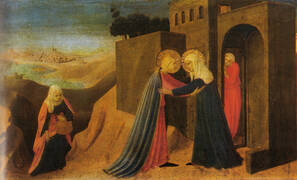The Magnificat
My soul magnifies the Lord,
my spirit rejoices in God, my Saviour.
He looks on his servant in her lowliness;
henceforth all generations will call me blessed.
The Almighty works marvels for me.
Holy his name!
His mercy is from age to age,
on those who fear him.
He puts forth his arm in strength
and scatters the proud-hearted
He casts the mighty from their thrones
and raises the lowly.
He fills the starving with good things,
sends the rich away empty.
He protects Israel, his servant,
remembering his mercy,
the mercy promised to our fathers,
to Abraham and his sons for ever.
Canticle of the Blessed Virgin 
Catechesis by Pope Benedict XVI
General Audience, Wednesday 1 February 2006 - also in Croatian, French, German, Italian, Portuguese & Spanish
"Dear brothers and sisters,
1. We have now arrived at the final destination of the long itinerary begun five years ago, in the spring of 2001, by my beloved Predecessor, the unforgettable Pope John Paul II. The great Pope had wanted to travel in his catecheses the whole sequence of the Psalms and Canticles that constitute the fundamental praying fabric of the Liturgy of Lauds and Vespers. Having now come to the end of this textual pilgrimage, similar to a journey in a garden flowered with praise, invocation, prayer and contemplation, let us now make space for that Canticle which ideally seals every celebration of Vespers, the Magnificat (Lk 1, 46-55).
It is a song that reveals in filigree the spirituality of the biblical anawim, namely of those faithful who recognized themselves "poor" not only in detachment from all idolatry of riches and power, but also in profound humility of heart, stripped of the temptation of pride, open to the irruption of the divine saving grace. Indeed, the whole Magnificat is marked by this "humility", in Greek tapeinosis, which indicates a situation of concrete humility and poverty.
2. The first movement of the Marian canticle (cf Lk 1, 46-50) is a sort of solo voice that rises to heaven to reach the Lord. We hear the voice of Our Lady herself who speaks thus of her Saviour, who has done great things in her soul and in her body. In fact, note the constant resonance of the first person: "My soul... my spirit... my Saviour... they will call me blessed... great things have been done in me... ". The soul of the prayer is, thus, the celebration of divine grace which has made an irruption in the heart and in the existence of Mary, rendering her the Mother of the Lord.
The intimate structure of her praying song is, therefore, praise, thanksgiving, grateful joy. But this personal witness is not solitary and intimate, purely individualistic, because the Virgin Mother is conscious of having a mission to accomplish for humanity and her story is inserted within the history of salvation. And thus she can say: "His mercy extends from generation to generation over those who fear him" (v 50). With this praise of the Lord, Our Lady gives voice to all the redeemed creatures who in her "fiat", and thus in the figure of Jesus born of the Virgin, find the mercy of God.
3. It is at this point that the second poetic and spiritual movement of the Magnificat takes place (cf v 51-55). It has a more choral tonality, as if to the voice of Mary is associated that of the entire community of the faithful who celebrate the surprising choices of God. In the original Greek of Luke's Gospel we have seven aorist verbs, which indicate the same number of actions that the Lord accomplishes in a permanent way in history: "He has shown strength... He has scattered the proud... He has overthrown the mighty... He has raised up the humble... He has filled the hungry with good things... He has sent the rich away empty... He has helped Israel".
In this septenary of divine works, the "style" with which the Lord of history inspires his behaviour is evident: He ranks Himself on the side of/takes the part of the last. His is a project that is often hidden under the opaque terrain of human events, which see "the proud, the mighty and the rich" triumph. Yet his secret strength is destined in the end to be revealed, so as to show who are God's true beloved ones: "Those who fear him", faithful to his word: "the humble, the hungry, Israel his servant", namely the community of the people of God who, like Mary, is made up of those who are "poor", pure and simple of heart. It is that "little flock" which is invited not to be afraid because the Father is pleased to give to it his kingdom (cf Lk 12, 32). And thus this song invites us to associate ourselves with this little flock, really to be members of the People of God in purity and in simplicity of heart, in God's love.
4. Let us then accept the invitation that St Ambrose, the great Doctor of the Church, addresses to us in his commentary on the text of the Magnificat: "May the soul of Mary be in each one to magnify the Lord, may the spirit of Mary be in each one to exult in God; if, according to the flesh, one alone is the Mother of Christ, according to faith all souls generate Christ; each in fact welcomes in themself the Word of God.... Mary's soul magnifies the Lord and her spirit exults in God because, consecrated in soul and spirit to the Father and to the Son, she adores with devout affection one God, from whom everything comes and one Lord, by virtue of whom all things exist" (Esposizione del Vangelo secondo Luca, 2, 26-27: Saemo, XI, Milano-Roma 1978, p 169).
In this marvellous commentary on the Magnificat by St Ambrose, I am touched always particularly by the surprising words: "If, according to the flesh, one alone is the Mother of Christ, according to faith all souls generate Christ; each in fact welcomes in themself the Word of God". Thus the holy Doctor, interpreting Our Lady's own words, invites us to ensure that in our own souls and in our lives the Lord finds a dwelling place. We must not only bear Him in our hearts, but we must bear Him to the world, so that we too can generate Christ for our times. Let us pray to the Lord that He may help us magnify Him with the spirit and soul of Mary and to bear anew Christ to our world."
Saluti:
"Je suis heureux d’accueillir les pèlerins francophones présents ce matin, notamment les Directeurs diocésains de l’Enseignement catholique de la province de Marseille, accompagnés de Monsieur le Cardinal Bernard Panafieu, les Directeurs et les enseignants du diocèse de Rouen, les jeunes du lycée Saint-Paul de Lille, ainsi que les servants d’autel de Versailles. Puisse votre séjour affermir votre foi et faire grandir en vous le désir de la sainteté !
I am happy to offer a warm welcome to all the English-speaking visitors and pilgrims present at today's Audience. I extend particular greetings to the groups from England, Ireland, Denmark, Norway and the United States of America. May your time in Rome strengthen your faith and renew your love for the Lord and his Blessed Mother. May God bless you all!
Von Herzen begrüße ich alle deutschsprachigen Pilger und Besucher, insbesondere die bayerische Abordnung des Sozialdienstes Katholischer Frauen, denen ich für ihren Dienst am Leben und am Menschen herzlich danke. Jeden Tag haben wir allen Grund, dem Herrn zu danken. Ein Herz, das vom frohen Lob Gottes erfüllt ist, erleuchtet auch die eigene Umgebung. Preist also mit euren Worten und Taten Gottes Treue zu uns Menschen! Gottes guter Geist geleite euch auf allen euren Wegen.
Me es grato saludar ahora cordialmente a los visitantes de lengua española, venidos de España y de Latinoamérica, de modo especial a los seminaristas de la diócesis de Ávila, acompañados por su Obispo Monseñor Jesús García Burillo, así como a los diversos grupos parroquiales españoles; saludo también a los peregrinos de México. Junto con la Virgen María, demos gracias al Señor por todos los dones que ha concedido y sigue concediendo a cada uno de nosotros. Muy agradecido por vuestra visita.
Pozdrawiam obecnych tu Polaków. Dzisiaj zakończyliśmy rozważania Psalmów i Kantyków z Liturgii Godzin. Maryjnym Magnificat dziękujemy Bogu za ten dar Ducha Świętego, skarbiec wiary i Bożej mądrości. Zachęcam wszystkich do korzystania z tych natchnionych modlitw. Niech będzie pochwalony Jezus Chrystus.
Pozdravljam vas, dragi verniki iz župnije Bloke v Sloveniji! Romanje na grobove apostolov Petra in Pavla naj vam bo močna spodbuda za lepo krščansko življenje. Naj vas spremlja moj blagoslov!
* * *
Cari fratelli e sorelle,
Do ora un cordiale benvenuto ai pellegrini di lingua italiana. Rivolgo anzitutto un affettuoso pensiero al Maestro Mons. Giuseppe Liberto e ai cantori della Cappella Sistina, oggi presente a conclusione del ciclo di catechesi di commento ai Salmi e ai cantici che compongono la Liturgia delle Ore. Ci hanno cantato in modo meraviglioso il Magnificat. Cari amici, desidero esprimere il mio grato apprezzamento per il servizio che prestate nelle celebrazioni liturgiche presiedute dal Successore di Pietro; vi sono specialmente riconoscente per aver animato con il canto le Udienze Generali. Grazie di tutto.
Saluto poi voi, cari Vescovi partecipanti al 30° convegno promosso dal Movimento dei Focolari, e vi incoraggio ad approfondire sempre più l'autentica spiritualità di comunione che deve contraddistinguere il ministero presbiterale ed episcopale.
Saluto inoltre voi, che prendete parte al Capitolo generale degli Oblati di S. Giuseppe e auguro a voi e alla vostra Famiglia religiosa di continuare con generosità il servizio che rendete a Cristo e alla Chiesa, seguendo fedelmente le orme del fondatore San Giuseppe Marello.
Saluto infine i malati e gli sposi novelli. Ieri abbiamo celebrato la festa dei Santi Cirillo e Metodio apostoli e primi diffusori della fede tra i popoli Slavi. La loro testimonianza vi aiuti ad essere anche voi apostoli del Vangelo, fermento di autentico rinnovamento nella vita personale, familiare e sociale."

